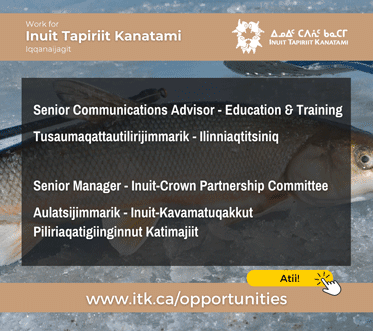QIA should develop supplementary health insurance for Inuit
NIHB doesn’t cover many necessary dental, medical procedures
Editor’s note: This is a copy of a letter to the president and board of the Qikiqtani Inuit Association that the author asked us to publish.
I’m writing to you today to request that the Qikiqtani Inuit Association board consider developing and approving a supplementary insurance program for Baffin Inuit.
I believe that if QIA approved such a program, the quality of life for Inuit in the Baffin region would be enhanced greatly, and also, it would reflect on the QIA and board as a proactive and visionary organization.
As an Inuk from the Baffin region who has dealt with the Non-Insured Health Benefits program all my life, I am quite aware of the shortcomings of the NIHB program, which is to provide eligible Inuit with a specified range of medically necessary health-related goods and services when they are not covered through private insurance plans or provincial-territorial health and social programs.
Non-Insured Health Benefits include prescription drugs, over-the-counter medication, medical supplies and equipment, short-term crisis counselling, dental care, vision care, and medical transportation.
Again, in my experience the services offered to Inuit have been decreasing steadily without explanation or positive intervention from Inuit organizations such as Nunavut Tunngavik Inc. or Inuit Tapiriit Kanatami.
What other Canadians take for granted today as a given right under the Canada Health Act can and is being taken away from Inuit without explanation.
For example, up until the last few years, Inuit were able to receive one full dental cleaning per year.
Full proper dental cleaning requires two units of time — each unit consisting of one half hour — and now Inuit through NIHB are only approved one unit — a half hour — per year, which is not sufficient for a full proper dental cleaning.
This is short-sighted of NIHB, as much research has shown the long term cost effectiveness of prevention versus care. This is more critical in the Baffin region, where in many communities there are no dental hygienists or preventative care. This is one example.
Yet if an Inuk is employed either through the federal, territorial or municipal government, that Inuk would have the other unit covered through Greenshield health insurance which is supplemented by their employer.
For Inuit that are not employed there is no supplementary coverage, which is why I am writing this letter.
The example I have given is one of many, and again the decrease for dental cleaning from two to one unit per Inuk per year was done without explanation or notice. There are other examples involving decreases in all areas of the NIHB program.
Where does this leave unemployed Inuit? Who will represent the concerns and decreasing health coverage of unemployed Inuit?
This is where I feel that QIA can take leadership and assume a visionary and proactive role in representing the health interests of unemployed Inuit in Baffin.
I’ve had this concern for many years, but feel now is the time that QIA can succeed in ensuring our health interests. This may be accomplished by negotiating all IIBAs to include a provision to cover health and or other insurance needs of Inuit in Baffin.
Is this doable? QIA can begin by conducting and gathering preliminary research:
• How many Inuit are unemployed in Baffin and do not have supplementary health insurance?
• How much would it cost to cover unemployed Inuit for supplementary health benefits, including medical travel?
• What are the health statistics for Baffin Inuit and future trends in health issues? (Some of this information is available through the 2007 Inuit Health Survey.)
Using the above information can be determine the feasibility and costs of purchasing supplementary health insurance and then the offset through IIBAs.
An add-on that can also be determined is life insurance for all Inuit in Baffin, basic life insurance for Inuit that would cover funeral costs, which are exorbitant.
I think the time is now for such a programs. I think this is very doable and I feel that it could not only enhance the quality of life for Inuit in the Baffin but it could also save lives especially in the area of drug costs.
There are many costly life-saving drugs that Baffin Inuit may not be receiving from their health care provider because they are unemployed and uninsured.
Further to insurance programs, I have researched and reviewed QIA’s mandate and website. QIA’s board may consider expanding the social and cultural division to include health issues and a health mandate.
If Inuit are not healthy and do not have access to proper health care and services, social and cultural will not matter, health and our healthy well-being as Inuit is first, foremost and fundamental.
As global warming destroys our way of life and our ability to hunt and access our traditional diet, as cancer rates soar, the health and well-being of our people will be affected, will we be prepared as Inuit?
Madeleine d’Argencourt
Iqaluit
Email your letters to editor@nunatsiaq.com.
Nunatsiaq News welcomes letters to the editor. But we are under no obligation to publish any given letter at any given time.
In our print edition, we usually print letters on a first-come, first-served, space-available basis. In our online edition, we usually print letters as soon as we are able to prepare them for publication.
All letters are edited for length, grammar, punctuation, spelling, taste and libel. You may withhold your name by request, but we must know who you are before we publish your letter.





(0) Comments